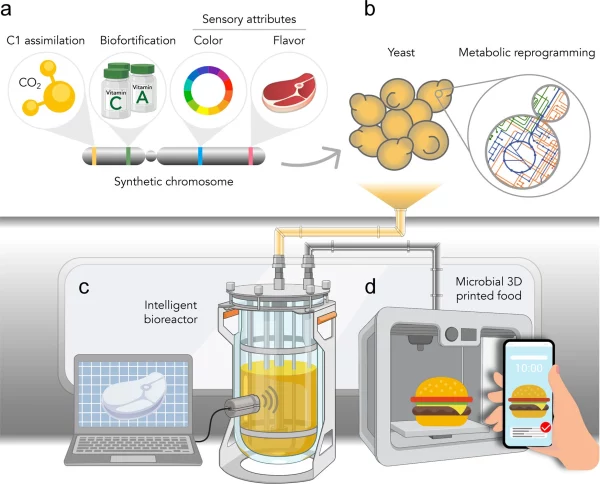Cow-free milk may sound like a strange concept, but it is one of the groundbreaking scientific advancements in the food industry. The development of biotechnology has led to the creation of milk without milking cows, opening up opportunities not only for vegetarians but for the entire community as we face challenges related to environmental protection and sustainable development.
The technology to create cow-free milk was developed by a research team at Real Vegan Cheese. Instead of using animals, they applied advanced biotechnology techniques to transform yeast cells into milk-producing factories. This process begins by sending DNA through the mail to insert specific gene segments into yeast cells. These gene segments contain instructions that guide the yeast cells to produce proteins found in cow’s milk. From there, scientists can create milk, and even cheese, without the need for any cows.
“We are approaching a world where the boundary between ‘natural’ and ‘artificial’ becomes blurred, where amateurs can craft food that is both artistic and highly processed,” said Dr. Tesar, the lead researcher, in an interview (Nature Biotechnology, 2024). The production of milk from yeast can be seen as a revolution in the food industry, as it addresses sustainability issues while helping reduce the environmental impact, particularly in cutting down greenhouse gas emissions from livestock farming.
One of the noteworthy aspects of this research is that the team has identified 11 key proteins that will serve as the essential ingredients for creating vegan cheese, a product many consumers are seeking as an alternative to animal-based cheese. Scientists predict that in the future, this plant-based milk will be able to compete directly with traditional cow’s milk in terms of both quality and nutritional value.
“We are on the verge of creating a world where animals are no longer needed to produce food, yet quality and variety in the diet are still ensured,” Dr. Tesar continued to share (Nature Biotechnology, 2024).
With this development, it’s not just about reducing dependence on livestock farming, but also a major step forward in addressing global food security issues. These inventions could help reduce water pollution, save land, and prevent the decline in biodiversity. Alongside cow-free milk production, scientists are rethinking how we process food while exploring new potentials for creating more sustainable and healthier food for consumers.

This breakthrough in cow-free milk technology does not just stop at producing vegan milk and cheese; it also opens up the possibility of producing food from cells and biotechnology that can meet the growing food demand of the global population. In the near future, this will become an official food choice, not only for vegetarians but also for anyone concerned with sustainable development and protecting the planet.
The future of the food industry is being shaped by revolutionary advancements like this. Cow-free milk is a prime example of how technology can create food that is not only safe, nutritious but also environmentally friendly and resource-efficient. This is a major breakthrough in science and food, affirming that technology can help us build a sustainable and planet-friendly food future.


HPX24h > Science > Cow-Free Milk: The Food Revolution Shaping Our Future
Top Reads from This Category
Science
Mind-Controlled Prosthetics: A Groundbreaking Advancement in Medicine
Science
Laser Therapy Could Help Regrow Your Teeth – Did You Know?
Science
Why Cultured Meat Could Be the Future of the Food Industry
Science
NSF Cuts 168 Jobs – Is the U.S. Scientific Community in Danger?
Science
The First Person to Experience Physical Sensations Through a Prosthetic Hand
Science
Work 3.5 Days a Week and Live to 100: This Could Be Your Future
Science
Discovery of a New Stem Cell: A Major Advancement in Creating Human Organs
Discover New Topics
Science
Stem Cell Therapy for Lung Cancer: A New Hope Entering Human Trials
Fitness
Aerobic and Anaerobic: The Right Training Secrets for Overall Health and Strength
Healthy Eating
Does Bone Broth Really Help Relieve Joint Pain and Improve Skin?
Healthy Eating
Does Drinking Water Help with Weight Loss? The Science Behind It and How to Apply It Properly
Parenting Tips
Sleep Apnea in Preschoolers: Understanding It to Protect Your Child’s Health
Fitness
Secrets to Building Muscle with Exercise: From Technique to Habit Maintenance
Animals
Baboons With Stable Relationships Live Longer and Show Greater Kindness
Animals
The Secret Behind Turtle Eggs Hatching at the Same Time: A Fascinating Reason
Health
Are ‘Forever Chemicals’ Present in Bandages? How This Could Affect Your Health
Animals
The Care of Offspring: The Reproductive Secrets of Guppies
Animals
Secrets to Surviving Antarctic Freezing Cold Through RNA Editing
Space
The Relationship Between Star Formation and the Activity of Supermassive Black Holes
Healthy Eating
Vegan Keto Diet: Everything You Need To Know